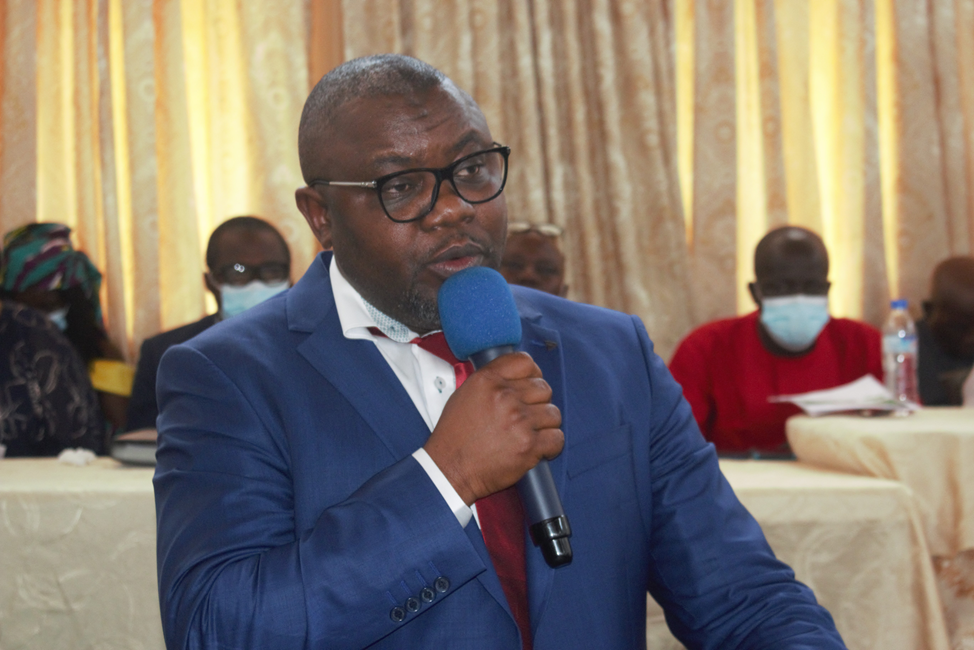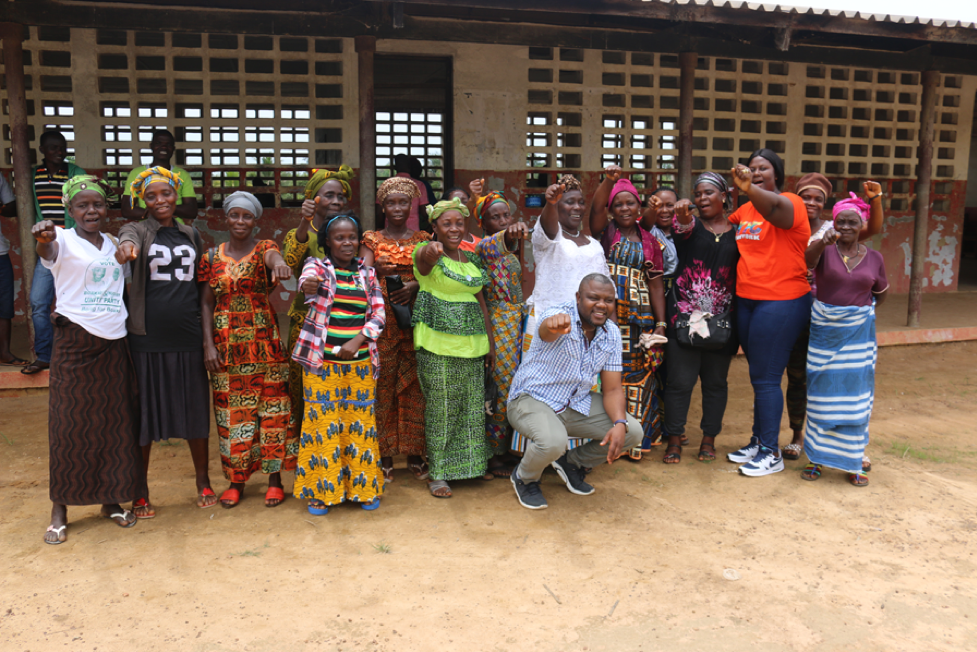Top: Women pose with a fist in Gbonota in Bong County in 2019 with Tenure Facility’s Dr. Raymond Samndong (squatting) and Loretta Pope-Kai of the Foundation for Community Initiatives (third from the right). The DayLight/James Giahyue
By Gabriel M. Dixon
MONROVIA – In 2019, Tenure Facility supported the Protection of Customary Collective Community Land Rights in Liberia (P3CL). approximately half of a million hectares of forestland, the project has reached 24 communities in eight of the 15 counties of Liberia. Twenty of those communities have been certified as landowning communities by the LLA, now waiting for the confirmatory survey to get their deed.
“The Tenure Facility is committed to continuing its support to customary land rights formalization process for all the communities already supported to complete the step and own their land deed,” said Dr. Samndong, the organization’s head for monitoring, evaluation and learning, at a land conference held in Buchanan, Grand Bassa County earlier this month.
An international financial mechanism based in Stockholm, Sweden, Tenure Facility supports rural communities around the world in securing land and forest rights and ownership. Since 2015, the organization has spent over US$3 million on projects that have helped scale up recognition of the rights of rural communities and facilitated the process for communities to claim their rights to customary land in Liberia. The Tenure Facility pilot project in 2015, established the Community Self Identification (CSI) Guide, now integrated into the Land Rights Act of 2018 as the first step of the process leading to the legal recognition of customary land rights.
Before Liberia created its Land Rights Act in 2018, only the government and private individuals owned land across the country. When the state negotiated forest, mining and agriculture agreements that affected local communities, rural people were left out. But that changed with the creation of the Land Rights Act in 2018. Unlike the 1956 Public land law (revised in 1973), the new law guarantees land rights for customary communities, including women and youth.
However, implementation of the law has been a huge challenge, with the Land Authority lacking funding to access remote communities and locals still unaware of the law more than three years since its creation. And despite their rights being guaranteed under the Land Rights Act, women still face challenges from a male-dominated society.
Through its implementing partners—Parley Liberia, Foundation for Community Initiatives (FCI) and the Sustainable Development Institute (SDI)—Tenure Facility has assisted some communities in the formalization of customary land. The Tenure Facility’s projects have targeted women.
“Gender mainstreaming has been a crucial part of…..increasing women inclusion for the first time in community land governance structures and increased overall the women and youth participation in the entire project implementation,” said Dr. Samndong.

The projects also helped strengthen the knowledge of chiefs in the administration of local land across the country. Towns and villages once at loggerhead over boundary disputes have banished their demons.
“Women’s rights are now respected,” said Moses Wegee, the Town Chief of Dumah Town in the Kpatawee Clan of Suakoko District, Bong County. “We know now that our sisters have right to land whether you are blind, cripple or have no husband you have right to your father’s land [like your brothers].”
“This program is very rewarding because we as district commissioners have a lot of problems in the district when it comes to land issues,” said Julia Russell, Commissioner of Wanhasa Administrative District, Lofa County at a land conference organized by Parley Liberia in Gbarnga, Bong County in 2020. “I am very happy that some of the chiefs are getting the idea that they will make the work easier for us. Boundary issues between villages, clans, it’s just a lot of headache,” he added.
Dr. Samndong reveled at the success of the organization’s endeavor in Liberia so far.
“The partners’ good relationship with the LLA has been significant for the success of the project. There have been many owners of this success, in addition to the [Liberia Land Authority], the local actors and the many development agencies that supported this process early on and continuously, like USAID and the World Bank…,” Samndong told over 250 delegates of the Land Conference.
“As a dedicated funding mechanism that was established to provide direct funding to indigenous peoples, Afro-descendants and local communities, over 75 percent of our disbursements [since 2017] have gone directly to local communities and Indigenous-led projects around the world,” Dr. Samndong said.
Tenure Facility is working in 13 countries around the world, enabling indigenous peoples, Afro-descendants and local organizations to build partnerships with champions in governments to advance the legal recognition of their collective land and forest rights.
This strategy has already advanced collective land-tenure security for roughly 7.2 million people across 12 of the 13 countries in which it works, covering 14 million hectares.
“In the next five years, the Tenure Facility is seeking to scale from 13 projects with indigenous peoples, Afro-descendants, and local community organizations to 48 plus projects,” Dr. Samndong said.




